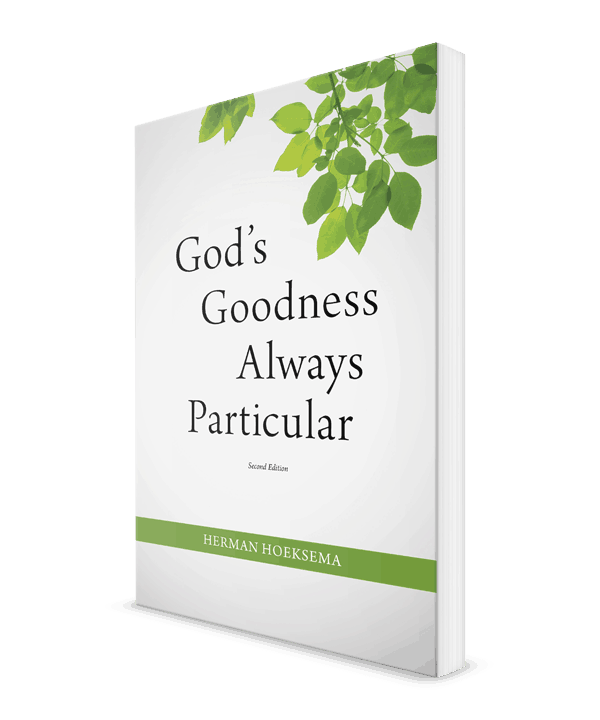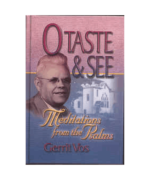What does the Bible teach regarding God’s attitude to the reprobate ungodly? What are the implications of the notion that Jehovah has an attitude of favour to the wicked? Do the Psalms support or give the lie to the theory of common grace? Does Zwier’s “triple cord” of biblical texts hold firm or is it cut to ribbons? Read and gain new appreciation for the truth that God’s goodness is always particular.
In this work, written in 1939, Herman Hoeksema answers a Rev. Daniel Zwier, who wrote an extensive series of articles defending the doctrine of common grace as adopted by the Christian Reformed Church in 1924. Rev. Zwier attempted to demonstrate the errors of Rev. Hoeksema and the Protestant Reformed Churches in their rejection of common grace. Zwier’s criticism was very pointed. Hoeksema’s reply was very pointed in return.
This book is extremely valuable for many reasons.
First, Rev. Hoeksema exposes the claim that to accept mutually exclusive propositions and to insist that “scripture teaches both” is a manifestation of “childlike faith.” Today, when propositional knowledge itself is being attacked, it is good to be regrounded on the biblical concept of logic. Hoeksema states,
[Zwier] is aware that we apply [what he calls] “miserable human logic,” which he despises, but we highly value as one of the noblest and most beautiful gifts of God to man and which we, in harmony with the will of God and in profound respect for the word of God, apply to the utmost of our power to the interpretation of scripture not to impose our notions on the holy scriptures … but to understand the scriptures in their own light (logical light, because it is light of revelation).
Second, Hoeksema exposes the dreadful implications and the absurdity of the doctrine of common grace for one’s conception of God. He uses the examples of Pharaoh, Nero and those who crucified Jesus to illustrate the terrible implications of the doctrine of common grace.
Third, Hoeksema clearly demonstrates the proper exegetical method of comparing Scripture with Scripture. This quote aptly describes the subject.
Zwier assumes that interpretation of a text apart from its connection with the current teaching of the Bible is interpretation of scripture, while I am convinced that the word of God is one organic whole that presents the same teaching throughout. Because of this, one can explain a certain text in the Bible without interpreting scripture. The whole of scripture must be considered when one interprets any particular passage, so that every text must be explained according to the rule of scripture … the current teaching of the Bible. The entire scriptural foundation on which Zwier attempts to build the superstructure of his doctrine of God’s general goodness consists of a few individual scriptural passages that superficially appear to support his view. However, his interpretation of them directly opposes not only several other clear texts of the Bible, but also the current teaching of Holy Writ. He is well aware of this conflict and admits it, but he refuses to explain scripture in its own light.
Fourth, in four chapters Hoeksema demonstrates that “scripture throughout teaches that God’s goodness is always particular and that the ungodly are never its object in time or eternity.”
Fifth, Hoeksema confronts the supposed “triple cord” of common grace proof texts put forth by Rev. Zwier (Psalm 145:9; Acts 14:16-17; Luke 6:35). They are the same texts used by the Christian Reformed Synod in 1924 and still wrongly interpreted by many today! The explanation of them is of great significance. Hoeksema severs each strand of Zwier’s “triple cord.”
Sixth, Hoeksema concludes by clarifying what happened at the Synod of 1924 and the days leading up to it. Had the ministers seceded from the Christian Reformed Church, as Rev. Zwier claimed, or had they been expelled? Had Rev. Hoeksema acted in harmony with or violated his promise governed by the Formula of Subscription? It is good that current and future generations understand what transpired then, in order to have an appreciation for the spiritual courage of their fathers and the doctrinal heritage that stems from their God-given boldness and convictions.
This work contains some of the most pointed and forceful writings of Hoeksema. His criticism of Zwier, his methods and his conclusions are simply devastating. This work is an example of how sharp one should be when doing battle with spiritual opponents. God’s honour is at stake. The arguments of those attempting to deny the truth and to teach error must be exposed. On the positive side, the proper explanations of some of the controversial passages are a refreshing reminder of how to understand these passages in light of all Scripture and the Reformed confessions.
As Hoeksema wrote in the preface to the book, “Let those who are shy of controversy remember that in this world it is impossible to maintain the truth unless one is ready and willing to defend it against gainsayers.”
For an excerpt of this book in Spanish, click here.
“God’s Goodness Always Particular—Excellent!” – London
“Just finished the book (God’s Goodness Always Particular). Excellent read.” – S. Wales
“Hoeksema does an incredible job [in God’s Goodness Always Particular] of not only handling a handful of disputed passages, but he demonstrates the ‘current’ of the Bible’s teaching on the doctrine of grace. It is hard not to look at the two denominations that came away from this theological battle in 1924 and not see that Hoeksema and company were right. Ninety-two years later, the PRC is still upholding the Reformed faith, still training ministers to be faithful to scripture, and still adhering faithfully to the Three Forms of Unity. [The] CRC is riddled with liberalism and moral relativism—the very things Hoeksema warned would come as a result of their pernicious doctrine of ‘common grace.’” – Illinois, USA
“Today I started to read Herman Hoeksema’s God’s Goodness Always Particular, which is a great work … The more I listen to HH … the more he is going to be on my list of favourite theologians.” – Netherlands
God’s Goodness Always Particular Reprinted
Since the contents of this book were originally Standard Bearer articles written in Dutch, the RFPA decided to translate these articles into English and print them in book format back in 1939. In 2016 we published a second edition of this book and printed 300 copies. By mid-2019 this book had sold out! Since we continued to receive requests for this book, we decided to keep it in stock and reprinted another 200 copies in May 2020. If you haven’t ever read this book, now is your chance to order a copy and give it a read!
From the Preface: “The material is controversial, but the reader will find sufficient positive instruction to make the reading worthwhile. Let those who are shy of controversy remember that in this world it is impossible to maintain the truth unless one is ready and willing to defend it against gainsayers.”—Herman Hoeksema
From the Foreword to the second edition: “Why is the Reformed Free Publishing Association publishing this book? It is polemical. The content is sharply worded. Motives are judged. Hoeksema says the content is controversial. None of this is popular today in the climate of political correctness.
Besides, is this controversy not ancient history? Does it really matter today? If it does matter, why does it matter? … The value of this book is no different from what it was almost eighty years ago. The reason is that the issue has not changed. At stake is still the doctrine of sovereign grace. In
the defense and development of the true doctrine of grace, the publisher is pleased to present the second edition of this book for the instruction and edification of God’s people.”
—Mark Hoeksema









